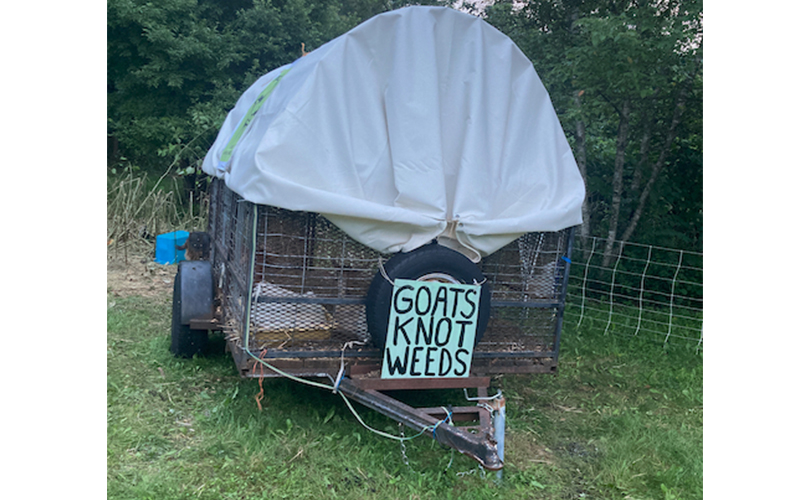The conservation commissions of Warren, Waitsfield and Fayston, in conjunction with Friends of the Mad River, will continue a goat grazing program this summer to help control invasive knotweed.
This marks the second year of the program, which launched in 2024 as a step to evaluate the effectiveness and efficiency of using goats as a natural alternative to herbicides, organizers said.

“Goat grazing is a management technique we started using in 2024,” said Jito Coleman, chair of the Warren Conservation Commission. “We had goats on about 10 acres of riverside land in three separate parcels from mid-June into early October. The goats did an effective job of knocking back the knotweed by eating the leaves. In fact, knotweed made up more than 50% of the goats’ diet.”
Each parcel was grazed three times during the season, which Coleman said was roughly equivalent to the impact of manually cutting knotweed three times per growing season.
“This year, we want to accelerate the program by getting the goats into the parcels starting in early May, when the shoots are young and succulent. They’ll rotate through the same parcels as last year through early October,” he said.
The process, known as “goatscaping,” interrupts the regrowth cycle of knotweed and other invasive plants without the use of toxic herbicides. Goats are widely used around the world to manage herbaceous invasives, and similar programs are underway in New York, Massachusetts, Rhode Island, and New Hampshire.
Locally, commissioners hope the program will evolve into a viable, sustainable business model that supports Vermont farmers and helps protect the state’s rivers and streams.
Coleman said the team plans to work again with Mary Beth Herbert, who owns the goats and managed the grazing effort last year. Herbert, an independent grazing manager, specializes in invasive species removal and has nearly a decade of experience using goat and sheep grazing techniques on both public and private lands.
The program is being operated by The Mad Goat LLC, co-founded by Mary Beth Hebert and Warren resident Carole Parker. The organization oversees goat and sheep grazing operations and brings extensive experience in land restoration and invasive species management.
Locally the fields in Warren and Waitsfield were selected for grazing due to their heavy infestation with mature knotweed, likely established following Tropical Storm Irene in August 2011, Coleman said.
Her expertise in managing invasive species dates back to her work with the National Park Service, where she first proposed rotational grazing as an alternative to mechanical methods like mowing and brush hogging, which had proven inefficient and costly.
Since then, Herbert has led grazing projects across the country, including along the Appalachian Trail, in Montpelier, and most recently with sheep on disputed Navajo reservation lands in Black Mesa, Arizona.
She has also worked with AmeriCorps conservation crews on the Colorado Plateau, the San Juan Island Youth Conservation Corps, the Green Mountain Club, and various educational programs in Vermont. Herbert now aims to launch her own business focused on invasive species control in the Mad River Valley and beyond.
“She’s passionate about addressing what she sees as one of the greatest threats to Vermont’s riparian environment – knotweed – which causes major erosion of rivers and streams,” Coleman said.
While the three towns have allocated funds for the commissions, an additional $7,500 is needed to fully cover the costs of the grazing program this year.
To help reach that goal, organizers have launched a GoFundMe campaign and are also accepting tax-deductible donations through Friends of the Mad River, a registered 501(c)(3) nonprofit.
TO DONATE
- Friends of the Mad River https://www.friendsofthemadriver.org/donate.html
- GoFundMe campaign: Coming soon
When donating, contributors can include a note designating their gift to the Goat Grazing Fund.













